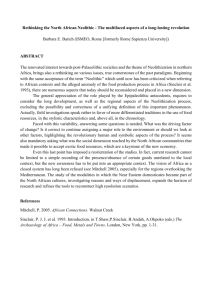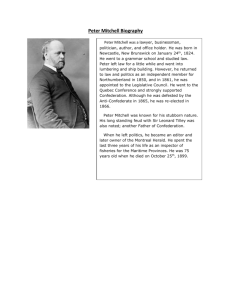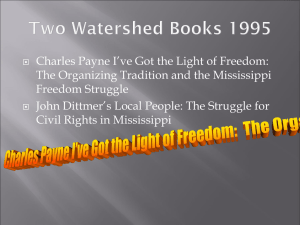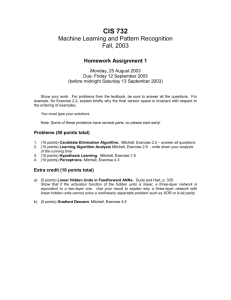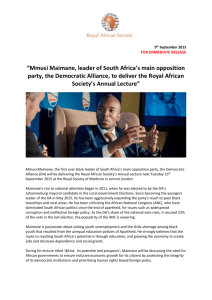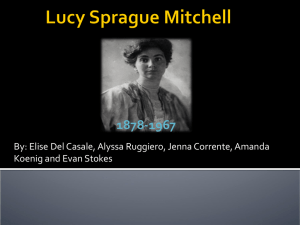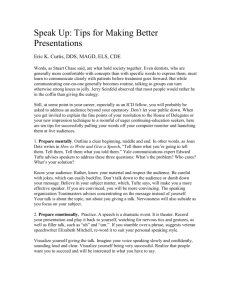Black Women in America - Department of History
advertisement
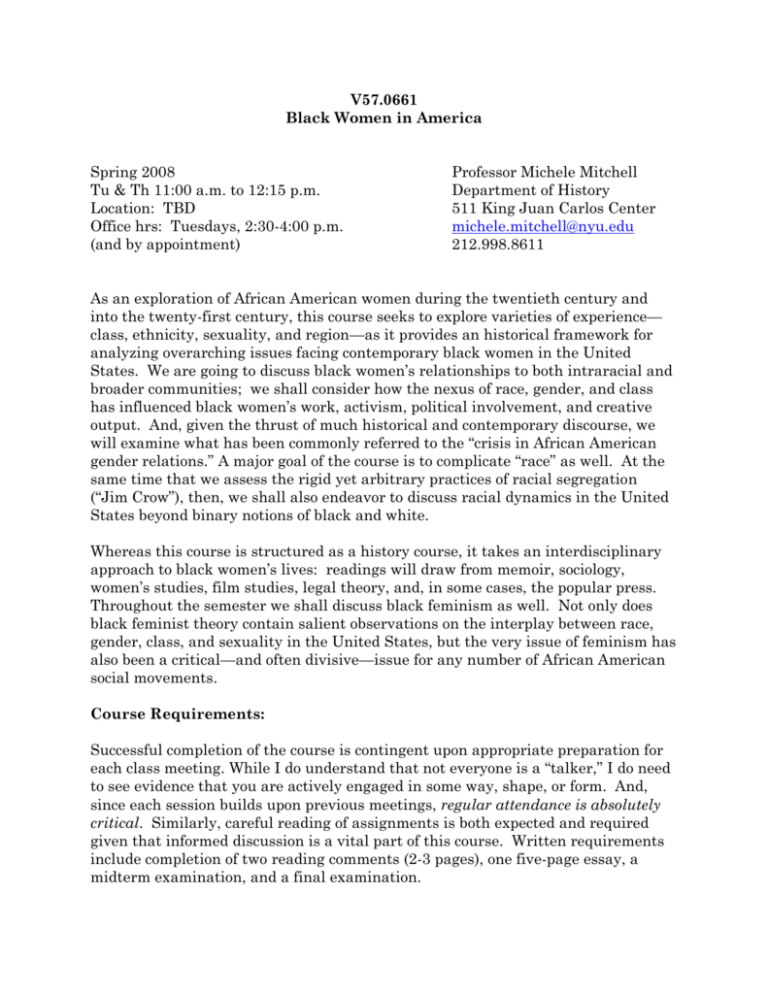
V57.0661 Black Women in America Spring 2008 Tu & Th 11:00 a.m. to 12:15 p.m. Location: TBD Office hrs: Tuesdays, 2:30-4:00 p.m. (and by appointment) Professor Michele Mitchell Department of History 511 King Juan Carlos Center michele.mitchell@nyu.edu 212.998.8611 As an exploration of African American women during the twentieth century and into the twenty-first century, this course seeks to explore varieties of experience— class, ethnicity, sexuality, and region—as it provides an historical framework for analyzing overarching issues facing contemporary black women in the United States. We are going to discuss black women’s relationships to both intraracial and broader communities; we shall consider how the nexus of race, gender, and class has influenced black women’s work, activism, political involvement, and creative output. And, given the thrust of much historical and contemporary discourse, we will examine what has been commonly referred to the “crisis in African American gender relations.” A major goal of the course is to complicate “race” as well. At the same time that we assess the rigid yet arbitrary practices of racial segregation (“Jim Crow”), then, we shall also endeavor to discuss racial dynamics in the United States beyond binary notions of black and white. Whereas this course is structured as a history course, it takes an interdisciplinary approach to black women’s lives: readings will draw from memoir, sociology, women’s studies, film studies, legal theory, and, in some cases, the popular press. Throughout the semester we shall discuss black feminism as well. Not only does black feminist theory contain salient observations on the interplay between race, gender, class, and sexuality in the United States, but the very issue of feminism has also been a critical—and often divisive—issue for any number of African American social movements. Course Requirements: Successful completion of the course is contingent upon appropriate preparation for each class meeting. While I do understand that not everyone is a “talker,” I do need to see evidence that you are actively engaged in some way, shape, or form. And, since each session builds upon previous meetings, regular attendance is absolutely critical. Similarly, careful reading of assignments is both expected and required given that informed discussion is a vital part of this course. Written requirements include completion of two reading comments (2-3 pages), one five-page essay, a midterm examination, and a final examination. Black Women in America—Spring 2008 (Mitchell) 2 The reading comments, participation, and attendance will count toward 20% of the final grade. The essay shall count 25%; the midterm examination will count 25% and the final examination 30%. Required Texts: Deborah Gray White, Too Heavy a Load: Black Women in Defense of Themselves, 1894-1994 (New York: W.W. Norton, 1999) Gerda Lerner, ed., Black Women in White America: A Documentary History (New York: Vintage, 1992) Beverly Guy-Sheftall, ed., Words of Fire: An Anthology of African-American Feminist Thought (New York: New Press, 1995) Bettye Collier-Thomas and V.P. Franklin, eds., Sisters in the Struggle: African American Women in the Civil Rights-Black Power Movement (New York: new York University Press, 2001) Johnnetta Betsch Cole and Beverly Guy-Sheftall, Gender Talk: The Struggle for Women’s Equality in African American Communities (New York: One World/Ballantine Books, 2003) Laurie Kaye Abraham, Mama Might Be Better Off Dead: The Failure of Health Care in Urban America (Chicago: University of Chicago Press, 1993) Lorene Cary, Black Ice (New York: Vintage, 1991) Veronica Chambers, Mama’s Girl (New York: Riverhead Books, 1996) Please note that additional course readings will be available as handouts, on Reserve, and/or in the course pack. Assignment Calendar: 2/12 3/6 4/10 4/24 5/8 reading comment on “matriarchy” & pathology in The Negro Family midterm examination paper on Cary & Chambers (5-7 pp.) reading comment (2-3 pp.) on poverty, health, and welfare final examination Course Calendar: January 22—Introduction Video: “Donahue” segment (1990) on Shahrazad Ali’s The Blackman’s Guide to Understanding the Blackwoman Cynthia M. Blair & Christine L. Minor, “We’re Still Waiting,” in Confusion By Any Other Name: Essays Exploring the Negative Impact of The Blackman’s Guide to Understanding the Black Women in America—Spring 2008 (Mitchell) 3 Blackwoman (Chicago: Third World Press, 1990), ed. Haki Madhubuti, pp. 10-11 Beverly Guy-Sheftall, “Exacerbating the Problem,” in Confusion By Any Other Name, pp. 26-30 January 24—A “Woman Question and a Race Problem” Beverly Guy-Sheftall, “Introduction: The Evolution of Feminist Consciousness Among African American Women,” in GuySheftall, Words of Fire, pp. 1-22 Pauline Terrelonge, “Feminist Consciousness and Black Women,” in Guy-Sheftall, Words of Fire, pp. 490-501 January 29—“Beyond the Veil”: The History of Black Women in America White, Too Heavy a Load, chs. 1-2 Documents: Lerner, Black Women in White America “Defend Black Women—and Die! The Lynching of Berry Washington” (1919), pp. 188-90 Ida Wells Barnett, “A Red Record” (1895), pp. 196-205 prefatory comments, “The Myth of the ‘Bad’ Black Woman” pp. 163-64 Fannie Barrier Williams, “The Accusations are False” (1904), pp. 16466 [Anonymous], “A Colored Woman, However Respectable, is Lower than the White Prostitute” (1902), pp. 166-69 Elise Johnson McDougald, “In Defense of Black Women” (1925), pp. 169-71 January 31—“Beyond the Veil”: The History of Black Women in America White, Too Heavy a Load, chs. 3-4 Documents: Lerner, Black Women in White America “Married Life of Georgia Peons” (1901), pp. 150-55 “We are Little More Than Slaves” (1912), pp. 155-58 “I Live a Treadmill Life” (1912), pp. 227-29 Emma L. Shields, “The Tobacco Workers” (1921), pp. 252-55 Elizabeth Ross Haynes, “Two Million Women as Work” (1922), pp. 25560 Mrs. Robert M. Patterson, “The Negro Woman in Politics” (1922), pp. 339-42 Black Women in America—Spring 2008 (Mitchell) Amy Jacques Garvey, “Women as Leaders” (1925), pp. 576-79 February 5—“Beyond the Veil”: The History of Black Women in America White, Too Heavy a Load, chs. 5-7 Documents: Lerner, Black Women in White America “Discrimination on WPA” (1935-1941), pp. 398-405 “Organizing at Winston-Salem, North Carolina” (1947-1951), pp. 26574 Pauli Murray, “Jim Crow & Jane Crow” (1964), pp. 592-99 Patricia Robinson, “Poor Black Women” (1970), pp. 599-602 February 7—“A Tangle of Pathology?”: The Black Matriarchy Thesis Kenneth Clark, “The Negro Matriarchy and the Distorted Masculine Image,” in Dark Ghetto: Dilemmas of Social Power (New York: Harper & Row, 1965), pp. 70-74 Daniel Patrick Moynihan et al., The Negro Family: The Case for National Action, reprinted in The Moynihan Report and the Politics of Controversy, ed. Lee Rainwater and William L. Yancey (Cambridge: The M.I.T. Press, 1967), pp. 47-94 February 12—Other Takes on Matriarchy Angela Davis, “Reflections on the Black Woman’s Role in the Community of Slaves,” in Guy-Sheftall, Words of Fire, pp. 20018 Jean Carey Bond and Patricia Peery, “Is the Black Male Castrated?,” in The Black Woman: An Anthology, ed. Toni Cade (New York: New American Library, 1970), pp. 113-18 Fran Sanders, “Dear Black Man,” in The Black Woman, pp. 73-79 Reading Comment: What, according to Moynihan, is the “tangle of pathology”? In what specific ways does Davis challenge Moynihan’s argument? (2-3 pp., due in class, February 12) February 14—Black Women in the Civil Rights Movement Barbara Ransby, “Behind-the-Scenes View of a Behind-the-Scenes Organizer: The Roots of Ella Baker’s Political Passions,” in Collier-Thomas and Franklin, Sisters in the Struggle, pp. 42-57 4 Black Women in America—Spring 2008 (Mitchell) 5 Rosa Parks, “‘Tired of Giving In’: The Launching of the Montgomery Bus Boycott,” in Collier-Thomas and Franklin, Sisters in the Struggle, pp. 61-73 Dorothy I. Height, “‘We Wanted the Voice of a Woman to be Heard’: Black Women and the 1963 March on Washington,” in CollierThomas and Franklin, Sisters in the Struggle, pp. 83-91 Documents: Lerner, Black Women in America Daisy Bates, “The Ordeal of the Children” (1962), pp. 414-24 Ella Baker, “Developing Community Leadership” (1970), pp. 345-52 Anne Moody, “All I Could Think of Was How Sick Mississippi Whites Were” (1968), pp. 425-31 February 19—Black Women, Black Power Cynthia Griggs Fleming, “Black Women Activists and the Student Nonviolent Coordinating Committee: The Case of Ruby Doris Smith Robinson and the Student Nonviolent Coordinating Committee,” in Collier-Thomas and Franklin, Sisters in the Struggle, pp. 197-213 Farah Jasmine Griffin, “‘Ironies of the Saint: Malcolm X, Black Women, and the Price of Protection,” in Collier-Thomas and Franklin, Sisters in the Struggle, pp. 214-29 Tracye A. Matthews, “‘No One Ever Asks What a Man’s Role in the Revolution Is’: Gender Politics and Leadership in the Black Panther Party, 1966-71,” in Collier-Thomas and Franklin, Sisters in the Struggle, pp. 230-56 Video: Black Panther Newsreel February 21—Social Movements & Sexual Politics Frances Beale, “Double Jeopardy: To Be Black and Female,” in GuySheftall, Words of Fire, pp. 146-55 Toni Cade, “The Pill: Genocide or Liberation,” in Cade, The Black Woman, pp. 163-69 Mary Ann Weathers, “An Argument for Black Women’s Liberation as a Revolutionary Force, in Guy-Sheftall, Words of Fire, pp. 158-61 The Combahee River Collective, “A Black Feminist Statement,” in Guy-Sheftall, Words of Fire, pp. 232-40 Black Women in America—Spring 2008 (Mitchell) 6 February 26—“Black Macho” and the Politics of Fallout Michele Wallace, “Anger in Isolation: A Black Feminist’s Search for Sisterhood,” in Guy-Sheftall, Words of Fire, pp. 219-27 Linda La Rue, “The Black Movement and Women’s Liberation,” in Guy-Sheftall, Words of Fire, pp. 163-73 Patricia Haden, Donna Middleton, and Patricia Robinson, “A Historical and Critical Essay for Black Women,” in Guy-Sheftall, Words of Fire, pp. 175-84 Video: Excerpts from Ntozake Shange’s For Colored Girls February 28—Hill, Thomas, and Discourses on Black Sexuality “Statement of Anita F. Hill to the Senate Judiciary Committee,” in African American Women Speak Out on Anita Hill-Clarence Thomas, ed. Geneva Smitherman (Detroit: Wayne State University Press, 1995), pp. 19-24 “Statement of Clarence Thomas to the Senate Judiciary Committee,” in African American Women Speak Out on Anita Hill-Clarence Thomas, pp. 25-30 Gwendolyn Etter-Lewis, “High-Tech Lynching on Capitol Hill: Oral Narratives from African American Women,” in AfricanAmerican Women Speak Out on Anita Hill-Clarence Thomas, pp. 80-99 Video: segments of Clarence Thomas confirmation hearings March 4— Reaction to Hill/Thomas Cole and Guy-Sheftall, “Collisions: Black Liberation versus Women’s Liberation,” in Gender Talk, pp. 71-101 Nell Irvin Painter, “Hill, Thomas, and the Use of Racial Stereotype,” in Race-ing Justice, En-Gendering Power: Essays on Anita Hill, Clarence Thomas, and the Construction of Social Reality, ed. Toni Morrison (New York: Pantheon, 1992), pp. 200-14 [African American Women in Defense of Ourselves statement], “Black Women and Clarence Thomas,” Eyewitness: A Living Documentary of the African American Contribution to American History, ed. William Loren Katz (New York: Simon & Schuster, 1995), p. 576 March 6— MIDTERM EXAMINATION Black Women in America—Spring 2008 (Mitchell) 7 March 11— Sexuality Darlene Clark Hine, “Rape and the Inner Lives of Black Women in the Middle West: Preliminary Thoughts on the Culture of Dissemblance,” in Guy-Sheftall, Words of Fire, pp. 380-87 Cheryl Clark, “Lesbianism: An Act of Resistance,” in Guy-Sheftall, Words of Fire, pp. 242-51 June Jordan, “A New Politics of Sexuality,” in Guy-Sheftall, Words of Fire, pp. 405-11 Video: Girls Like Us March 13—More than Mammy, Jezebel, & Sapphire?: Images of Black Women in Mainstream Popular Culture Cole and Guy-Sheftall, “No Respect: Gender Politics and Hip-Hop,” in Gender Talk, pp. 182-215 Video: sequence from Amos & Andy; sequence from Cleopatra Jones; sequences from popular television sitcoms March 18—No class: Spring Break March 20—No class: Spring Break March 25—Memoir as Commentary on Privilege: Class, Race, Education Lorene Cary, Black Ice March 27—Memoir as Commentary on Privilege Cary, Black Ice April 1—Memoir as Testament Veronica Chambers, Mama’s Girl April 3—Memoir as Testament Chambers, Mama’s Girl Paper (5-7 pages): Compare the ways in which Chambers and Cary discuss education and their respective aspirations; do so by discussing their analyses of class, race, and gender (due in class, April 10) Black Women in America—Spring 2008 (Mitchell) 8 April 8—“To Be Young, Gifted, & Black”: Lorraine Hansberry section on A Raisin in the Sun in Mark A. Reid, Redefining Black Film (Berkeley: University of California Press, 1993), pp. 57-68 “Breaking Restrictive Covenants” (1948), in Lerner, Black Women in White America, pp. 410-13 Film: A Raisin in the Sun (1961); with Ruby Dee, Sidney Poitier, Claudia McNeil, Diana Sands, Louis Gossett, Ivan Dixon April 10—“To Be Young, Gifted, & Black”: Lorraine Hansberry Margaret B. Wilkerson, “Lorraine Hansberry,” in Guy-Sheftall, Words of Fire, pp. 125-27 Lorraine Hansberry, “Simone de Beauvoir and The Second Sex: An American Commentary,” in Guy-Sheftall, Words of Fire, pp. 12842 conclusion: A Raisin in the Sun April 15—“Unbought & Unbossed”: Pioneering Women in National Politics Linda Faye Williams, “The Civil Rights-Black Power Legacy: Black Women Elected Officials at the Local, State, and National Levels,” in Collier-Thomas and Franklin, Sisters in the Struggle, pp. 306-32 Video: Chisholm ’72: Unbought and Unbossed April 17—The Persistence of Segregation and Poverty Laurie Kaye Abraham, Mama Might Be Better Off Dead: The Failure of Health Care in Urban America (Chicago: University of Chicago Press, 1993), pp. 1-24, 44-92 April 22— The Persistence of Segregation and Poverty Abraham, Mama Might Be Better Off Dead, pp. 93-110, 146-78 Reading Commentary: How does Abraham assess the constraints faced by poor women and their families? In what ways do issues pertaining to age inform Abraham’s analysis? (2-3 pp., due in class, April 24) Black Women in America—Spring 2008 (Mitchell) 9 April 24—The Politics of Black Women’s Health Shirley Chisholm, “Facing the Abortion Question,” in Guy-Sheftall, Words of Fire, pp. 390-95 Evelynn Hammonds, “Missing Persons: African American Women, AIDS, and the History of Disease,” in Guy-Sheftall, Words of Fire, pp. 434-49 Cole and Guy-Sheftall, “Black, Lesbian, and Gay: Speaking the Unspeakable,” in Gender Talk, pp. 154-81 Video: Skin Deep (entire) and segment from Public Housing April 29—Taking on the Law: Critical Race Theory Kimberle Williams Crenshaw, “Mapping the Margins: Intersectionality, Identity Politics, and Violence Against Women of Color,” in Critical Race Theory: The Key Writings That Formed the Movement, ed. Kimberle Crenshaw, Neil Gotanda, Gary Peller, & Kendall Thomas (New York: New Press, 1995), pp. 357-83 Regina Austin, “Sapphire Bound!,” in Critical Race Theory, pp. 426-37 May 1—A Crisis in Gender Relations? Cole and Guy-Sheftall, “Having Their Say: Conversations with Sisters and Brothers,” in Gender Talk, pp. 31-70 Cole and Guy-Sheftall, “Race Secrets and the Body Politic,” in Gender Talk, pp. 128-53 Video: Marlon Riggs, Black Is, Black Ain’t FINAL EXAMINATION: Thursday, May 8, 10:00 a.m. to 11:50 a.m.
